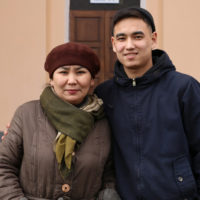Thomas (Tom) Orr is a Programme Officer with the Aga Khan Foundation Tajikistan in Dushanbe, who first came to Tajikistan as a fellow through the Aga Khan Foundation Canada’s International Youth Fellowship Program.
Meet Tom
Where I grew up in Nova Scotia, Canada (north of Maine), there are no high peaks. So when I first came to Tajikistan in Central Asia, I was exhilarated by the experience of cresting rugged mountains at altitudes of over 4,000 meters and meeting shepherds and villagers in the remotest places I had ever been.
I came to Tajikistan for a fellowship in international development and found so much more. Tajikistan’s Gorno-Badakhshan Autonomous Oblast (GBAO) presents a beautiful and yet challenging environment. It is nestled in Central Asia’s majestic Pamir Mountains, at a crossroads of the historic Silk Road that links Europe, Africa, the Middle East, China, and India. GBAO’s people boast a rich, centuries-old culture of warm hospitality, beautiful dance, handicrafts, and art. At the same time, in these mountains the challenges of limited physical and digital infrastructure, formidable difficulties in getting around, and remoteness make GBAO an impoverished region today. Achieving sustainable improvements in people’s lives is a tall order.
The Pull of Mountains
I became aware of these contrasts during my fellowship with the Mountain Societies Development Support Programme (MSDSP) Tajikistan. MSDSP is a local non-profit organization affiliated with the Aga Khan Foundation (AKF) in Tajikistan, and seeks to tackle challenges facing rural communities there. As a North American beginning to learn about the region, I found the notion of doing rural development in remote GBAO daunting.
It was through play, not work, that I became acquainted with the Pamir Eco-Cultural Tourism Association (PECTA), a tourism business association that helped to organize some of my eco-tourism trips. PECTA is a non-profit organization that supports the sustainable development of the Tajik tourism sector to benefit disadvantaged people in remote mountain areas.
Eco-Tourism Can Bring Change
PECTA was established with the support of MSDSP in 2008. As I came to realize, eco-tourism presents a strategic way of highlighting GBAO’s comparative advantages, with its beautiful landscape, age-old culture of hospitality, and mystique. PECTA leverages these to create income and jobs for rural people in some of the most isolated places in the world. It also supports related industries like restaurants, transportation, and handicrafts. Although agriculture and large-scale industry may not be well suited to this area due to challenges including the rugged topography, tourism has potential to improve people’s lives.
Since experiencing PECTA as a tourist, I have had the pleasure of working with the people there, helping to forge partnerships. I have also gained an appreciation of how PECTA’s work fits into the big picture of tourism in Tajikistan.
Exploring Beauty, Finding a Way to Contribute
The tourism development program complements other efforts of AKF and MSDSP to improve the quality of life for people in Tajikistan and contribute to national stability, including partnering with grassroots community organizations such as community-based savings groups. This all fits into the broader work of the Aga Khan Development Network to build an ecosystem for social transformation. It makes me happy that by exploring the country’s beauty, I have come to see a way where my energies can help contribute to that transformation.
Learn more about the tourism potential of Tajikistan and its Pamir Mountains: “Unveiling the Pamirs. Travelling Tajikistan” (www.unveiling-the-pamirs.com) and www.visitpamirs.com.
This post is part of the #humansoftheworld series on our blog—a collection of tales we can both relate to and marvel at. Here, we share stories of appreciation, self-reliance, and strength from across the Aga Khan Development Network.


